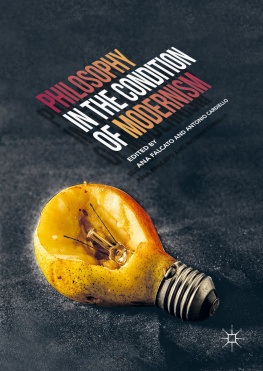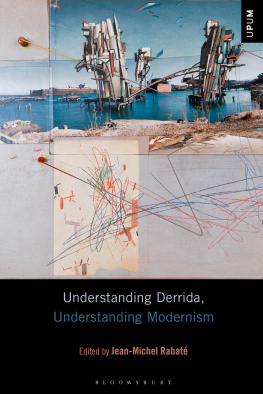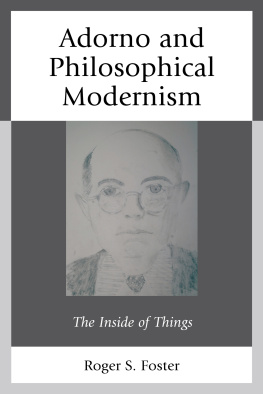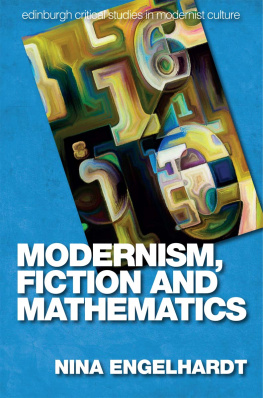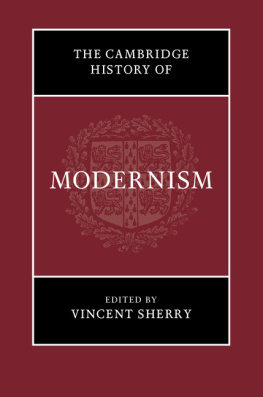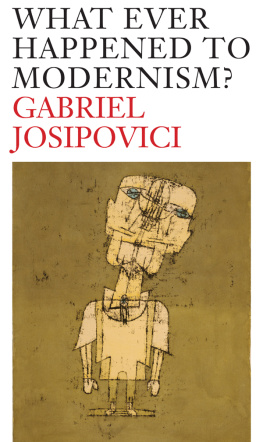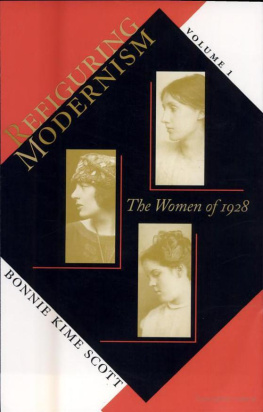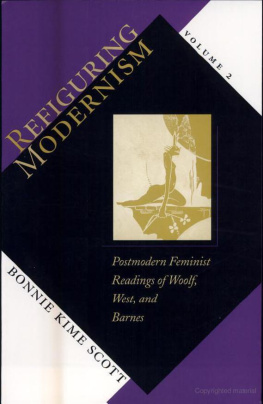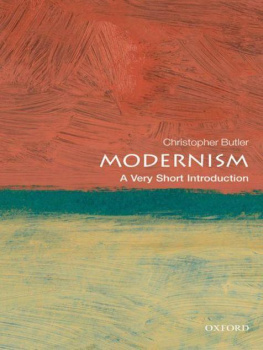1. Introduction: Philosophy and Literary ModernismAn Old Problem Finally Made New
Although approximately two-and-a-half-thousand years separate the birth of philosophy and the emergence of literary modernism in the last decade of the nineteenth century, these forms of spiritual creation face overlapping problems, however opposite their methods. Both philosophical works and modernist literary texts are characterised by reflexive density, which is typically made a self-standing topic and which thus allows for meta-reflectiona feature with a highly relevant linguistic impact, as we shall see in what follows. As such, the works of philosophy and the texts of modernism share what Michael Levenson has aptly termed forms of creative violence (Levenson : 2).
To take an example of creative violence from one of the most radical methods of inquiry developed by twentieth-century philosophy , i.e. hermeneutics, in The Beginning of Philosophy , Hans-Georg Gadamer exercises a certain interpretive violence against the famous passage from Metaphysics A , where Aristotle discusses the methodological shift opened by the causal paradigm deployed by the Presocratics, referring to Thales as the first philosopher to propose an entirely new explanatory tool to account for the origins of the universe. Gadamer writes:
Basically, our discussion is trying to show that we are standing here at the origin of doxography. [] For example, when Aristotle begins to speak in the Metaphysics of the first conception of cause and says that Thales proposed this and that Thales was the first thinker who did not simply recount myths but also made use of evidence , : 80)
Strictly speaking, Aristotle is not discussing the myths recounted by the poets and cosmologists whose work precedes the Milesians, but rather unfolding the specificity which comes from the attempt to explain the whole universe as stemming from a single cause. And yet, the hermeneutic freedom exercised by Gadamer himself will remind the attentive reader of the opposite theoretical hypothesis suggested by T.S. Eliot , who, when he reviewed Joyces Ulysses for The Dial in November 1923, wrote the following:
Mr. Joyces parallel use of the Odyssey has a great importance. It has the importance of a scientific discovery. No one else has built a novel upon such a foundation before: it has never before been necessary. If [Ulysses] is not a novel , that is simply because the novel is a form which will no longer serve; it is because the novel , instead of being a form, was simply the expression of an age which had not sufficiently lost all form to feel the need of something stricter. [] Instead of the narrative method, we may now use the mythical method. : 178)
Comparing these two remarkable passages, we seem warranted to conclude that both the philosophical method and the modernist method represent radical breaks with a given tradition. ), Anat Matar develops a historic-philosophical hypothesis for justifying the emergence of literary modernism in the last quarter of the nineteenth century, which she encapsulates in the following statement:
I see modernism as emerging from a unity of two philosophical insights, which matured in the nineteenth-century. The growing awareness of the loss of (or, alternatively, liberation from) the transcendent, stabilizing factor that enabled realist metaphysics led to novel conceptions of philosophy and of language alike. (: 7)
Matars methodology is strictly philosophical, and it aims at identifying, from within the evolution of modern philosophy itself, the conditions for the possibility of literary modernism as a radical artistic breakthrough. Besides making a conciliatory effort to bring together the analytic and the so-called continental traditions in philosophy , the author conceives of the anti-dogmatic obsession with language which typically characterizes modernist works as the logical consequence of a general disbelief in the existence of a metaphysical reality which transcends the subject and the very language she uses to describe the world as she perceives it. Matar does not content herself with diagnosis, however. A careful analysis draws her to the conclusion that the modernists replaced one dogmatism with another, by which she means that the most prestigious modernist artists swapped a linguistic for an essentialist form of dogmatism, whereas, she claims, only a thorough reflection on the ludic, performative and non-static character of human language can make room for a modernist overcoming of modernism .
A secondand arguably better-knownplatform for dialogue between philosophy and modernism can be found in the texts of Stanley Cavell (cf. 1969, 1971) and is fundamentally indebted to both an assessment of the Wittgensteinian notion of criteria and a highly original interdisciplinary borrowing of key concepts introduced by the American art critic Michael Fried , originally applied to the evolution of modern European painting . Cavell discusses and refines these concepts, suggesting that they are instrumental in working out an unconventional mode of writing and practicing philosophy . In a crucial passage from A Matter of Meaning It, included in the volume Must We Mean What We Say? , Cavell writes the following about the philosophical puzzle facing modernist artist and modern art critics alike:
The task of the modernist artist , as of the contemporary critic, is to find what it is his art finally depends upon; it doesnt matter that we havent a priori criteria for defining a painting , what matters is that we realize that the criteria are something we must discover, discover in the continuity of painting itself. But my point now is that to discover this we need to discover what objects we accept as paintings, and why we so accept them. (: 219)
An implicit message in this proposal of a permanent upgrading of the standing criteria which allow a modern viewer to recognize an artwork as such concerns the fact that pretty much the same can happen to the philosophical text itself. Stanley Cavell s texts are systematic disruptions of the common understanding held by a philosophical community concerning what an essay or dissertation in the discipline can reasonably be. Thus, the dynamic that inheres in linguistic playfulness, and which according to Matar is the untrodden path that makes the de-dogmatization of modernism possible, finds in the work of Stanley Cavell a highly significant instantiationand this at two distinct levels. On the one hand, as the above passage shows, he clearly refuses to accept formal criteria which would bind together all modern artworks; on the other hand, his prose embodies the very denial of criteria , as applied to philosophy , for which he stands when discussing modern art .
A further way to instantiate Matars claims about the de-dogmatization of contemporary philosophy a path she clearly doesnt takewas immediately pointed out when the book was first critically assessed. In a review of Modernism and the Language of Philosophy , published by Notre Dame Philosophical Reviews , Fabrice Pataut wrote the following: One fruitful way to open the dialogue Matar wishes to establish would be to consider acts of thought pertaining to the domain of fiction ().
This clearly addresses Matars failure to weigh the historical and conceptual relations between modernism and philosophy , but it is not a critique one could possibly level at Stanley Cavell s oeuvre , which includes books of essays and monographs that critically assess the works of writers like Shakespeare, Kierkegaard, Beckett, Thoreau, Emerson, Ibsen and J.M. Coetzee . And in ways that often run parallel to the Cavellian approach to the two fields of inquiry, the present book also fully addresses this demand for companionship between fiction and philosophical analysis.

